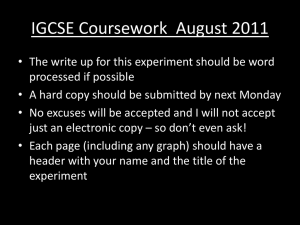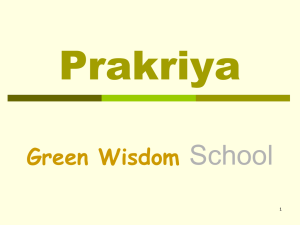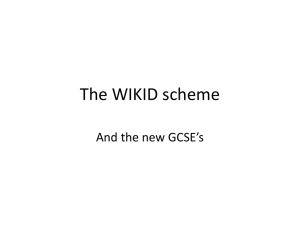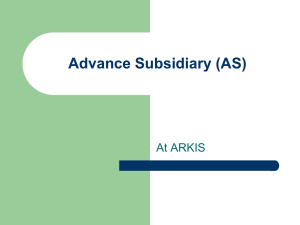Boldon English Department Handbook
advertisement
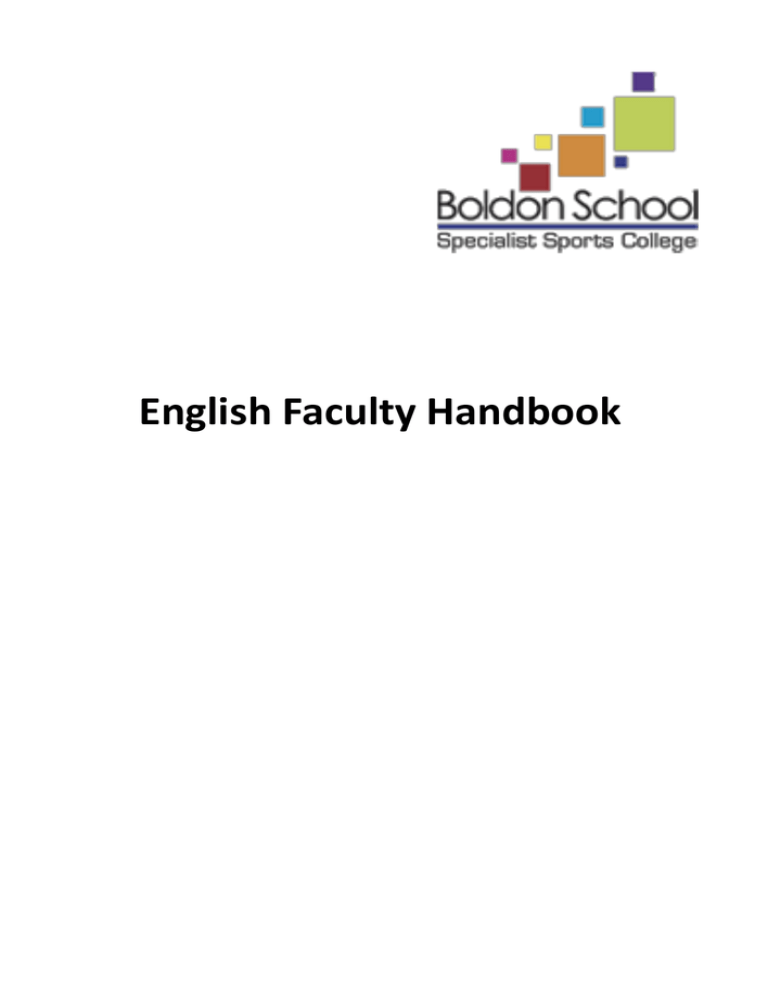
English Faculty Handbook This handbook is intended as a first point of inquiry for departmental staff, senior leaders and governors. It is my hope that it will provide them with an overview of the departments policies and practices. Contents: • The Faculty • English at Boldon – Faculty Teaching and Learning statement • Grouping and Setting policy • Overview of KS3 • Overview of KS4 • Cambridge IGCSE Syllabus Overview • Cambridge IGCSE Coursework • AQA Literature/Controlled assessments • Assessment and Recording Policy • Monitoring Policy • Homework Policy • Rewards, sanctions and behaviour • Intervention Policy Department Teaching and Learning statement English plays a pivotal role across the school curriculum and the world at large. Over the two key stages, every Boldon student will receive a rich and varied diet of English Language and Literature delivered in a challenging and engaging manner. It is our aim within the department to consistently: • • • • • • • Consider every student’s individual learning needs and accommodate accordingly to allow every student to make expected progress. To challenge and engage all students in lessons ensuring sufficient breadth and depth of content to stretch the most able as well as allow all pupils to make good progress Assess students’ progress regularly, (in line with department policy) and to monitor progress using relevant data to inform planning and set personal learning targets To monitor and track every students’ progress regularly and put in meaningful intervention strategies if necessary to ensure good progress for all Encourage students to develop a life-long love and enthusiasm for language and literature in all forms Enable students to become both critical and creative thinkers, readers and writers through the development of the skills and resources they will need to succeed in an increasingly literate and multimodal world Encourage a knowledge, understanding, appreciation and tolerance of the multicultural and multi-ethnic society and world in which we live Overview of KS3 Our programme of study and schemes of work in years 7,8 and 9 are primarily designed and created to equip the students with the necessary knowledge and skills in reading, writing and speaking and listening to achieve success at GCSE. Ks3 pupils will engage with novels, plays, poetry, drama, short stories, Shakespeare and quality non-fiction texts to name a few. Despite government confusion and mixed messages, it is the department’s intention to continue to grade assess work at KS3 in the traditional level format 1 -7. However in term 3, year 9 pupils will also receive a GCSE grade to facilitate the transition to KS4. Each module will give students opportunities to master the essential key reading/writing/speaking and listening skills required for Ks4. The key standards which students and the department will work with are outlined below: Reading: R 1 understand and collate explicit meanings R2 understand, explain and collate implicit meanings and attitudes R3 select, analyse and evaluate what is relevant to specific purposes R4 understand how writers achieve effects. Writing: W1 articulate experience and express what is thought, felt and imagined W2 order and present facts, ideas and opinions W3 understand and use a range of appropriate vocabulary W4 use language and register appropriate to audience and context W5 make accurate and effective use of paragraphs, grammatical structures, sentences, punctuation and spelling. Speaking and Listening: S1 understand, order and present facts, ideas and opinions S2 articulate experience and express what is thought, felt and imagined S3 communicate clearly and fluently S4 use language and register appropriate to audience and context S5 listen to and respond appropriately to the contributions of others Boldon School English Department KS3 – Overview 2014/15 Week 39 Week 38 SUMMER HOLIDAYS Assessment Week 39 Week 38 Week 37 Week 36 Week 35 Week 34 Week 33 Week 32 Week 31 Week 30 Week 29 Week 28 Week 27 Week 26 Week 25 Week 24 Week 23 Week 22 Week 21 Week 20 Week 19 Week 18 Week 17 Week 16 Week 15 Week 14 Week 13 Week 12 Week 11 Week 10 Week 9 SUMMER HOLIDAYS Assessment JUNE HALF TERM Assessment EASTER HOLIDAYS Assessment FEBRUARY HALF TERM Assessment CHRISTMAS HOLIDAYS Assessment OCTOBER HALF TERM Assessment Week 39 Week 38 Week 37 Week 36 Week 35 Week 34 Week 33 Week 32 Week 31 Week 30 Week 29 Week 28 Week 27 Week 26 Week 25 Week 24 Week 23 Week 22 Week 21 Week 20 Week 19 Week 18 Week 17 Week 16 Week 15 Week 14 Week 13 Week 12 Week 11 Week 10 Week 9 Week 8 Week 7 Week 6 Week 5 Week 4 Week 3 Week 2 Week 1 SUMMER HOLIDAYS Assessment JUNE HALF TERM Assessment EASTER HOLIDAYS Assessment FEBRUARY HALF TERM Assessment CHRISTMAS HOLIDAYS Assessment OCTOBER HALF TERM Assessment Detailed Schemes of Work/Lesson ideas/Starters and plenaries are on share point. Teachers in the department are encouraged to share resources in this area. Week 37 Week 36 JUNE HALF TERM Assessment EASTER HOLIDAYS Assessment FEBRUARY HALF TERM Assessment CHRISTMAS HOLIDAYS Assessment OCTOBER HALF TERM Week 8 Week 35 Week 34 Week 33 Week 32 Week 31 Week 30 Week 29 Week 28 Week 27 Week 26 Week 25 Week 24 Week 23 Week 22 Week 21 Assessment Week 7 Week 6 Week 5 Week 4 Week 3 Week 2 Week 1 1984 Time Machine Week 20 Week 19 Week 18 Week 17 Week 16 Week 15 Week 14 Week 13 Week 12 Week 11 Week 10 Week 9 Week 8 Week 7 Week 6 Week 5 Week 4 Week 3 Week 2 Week 1 • Key Stage 4 Poetry Moon on the Tides Relestionships iGCSE Coursework preparation • KS4 iGCSE intro’ AQA Literature texts Shakespeare – Macbeth Sci-Fi SoW/Slow Writing Gothic Unit/ Novel – Woman in Black Non Fiction Writing/Reading iGCSE Bill Bryson George Alligha Joe Simpson Ellen MacArthur iGCSE examples Shakespeare – Romeo and Juliet/Richard III Non Fiction Media/News and Advertising Poetry of WW1 YEAR 9 – SUMMER TERM YEAR 9 – SPRING TERM YEAR 9 – AUTUMN TERM The Island Alive Survivor Need for shelter Food, Fire, Water Slow writing and short stories Abomination or Holes YEAR 8 – SUMMER TERM YEAR 8 – SPRING TERM YEAR 8 – AUTUMN TERM UFO Roswell War of the Worlds Narrative Journal Boy In Striped Pyjamas Introduction to Shakespeare – The Tempest Introduction to Poetry – live texts, hedgehog, devices, vegans. Slow Writing and short stories Year 7 Transition Unit Stormbreaker/ Skellig YEAR 7 – SUMMER TERM YEAR 7 – SPRING TERM YEAR 7 – AUTUMN TERM Sequencing of KS3 Programme of Study 2014 – 2015 Year7 Unit 1: Compulsory First Unit: transition unit The Sleeping Sword or Stormbreaker Unit 2: Slow Writing/Tales In The Telling short stories Unit 3: Poetry Appreciation Unit 4: Shakespeare: Introduction to Shakespeare The Tempest Unit 5: Skellig/Boy In Striped Pyjamas Unit 6: UFO – Non Fiction/Fiction Themed Unit Year 8 Unit 1: Reader – Abomination/Holes Unit 2: Poetry of WW1 Unit 3: Non Fiction - Media, News and Advertising Unit 4: Shakespeare – Romeo and Juliet/ Richard III Unit 5: Slow Writing/Short Stories Unit 6: The Island – Non Fiction/Fiction Themed Unit Year 9 Unit 1: Non Fiction Writing/Reading – iGCSE Anthology extracts Unit 2: Gothic Fiction Unit/Novel Woman In Black Unit 3: Sci Fi SoW / Slow Writing Unit 4: Shakespeare – Macbeth Unit 5: KS4 Cambridge iGCSE Introduction/ AQA Lit’ Coursework prep’ Unit 6: KS4 Poetry – Moon On The Tides/iGCSE English Coursework prep’ Overview of KS4: Year 11 Students will follow the Cambridge iGCSE syllabus code 0500 for the first time this academic year. (See page 8 of the Handbook) The compressed two year programme will be delivered to current year 11 starting with the coursework requirements. This will need to be delivered quickly and monitored closely as achievement in module 4 is crucial to overall success. Students will follow either ‘core’ route or ‘extended’. Extended route will be followed in Tyne 1,2 and 3 and the core route will be followed by Wear band. Core and Extended students will not be grouped together as the exam requirements are different. Students in year 11 will also study AQA Literature over the course of this academic year (See AQA Literature) as this syllabus has already run for the past year. There are expected gaps in the completion of AQA literature controlled assessments; this is an area which will require immediate intervention. Year 10 Year ten students will have two years to complete iGCSE English and at this stage it is envisaged that they will also follow the AQA Literature route in parallel. However, this is not ‘set in stone’ as yet and may be subject to change. Year 10 will also start the course with a focus on coursework requirements. Teachers in the department are free to choose which coursework piece they tackle first. The speaking and listening unit could be completed early if teachers also wish. However, all department staff are urged to note and adhere to time frames. It is expected that all coursework (Components 4 and 6) are completed before the end of the academic year as exam practise is essential in year 11. Component 4 Coursework 3 pieces of written coursework are required to pass this component. Each piece must be between 500-800 words in length. Teachers may teach their own choice for assignments 1 and 2. However all teachers will teach the same extract for Assignment 3. • Assignment one: Informative, analytical and/argumentative • Assignment 2: descriptive and/or narrative • Assignment 3: a response to text/s chosen by the centre In KS4 Teachers and Students follow the iGCSE route outlined below. This consists of one exam paper (1’core’ or 2 ‘extended’) 50% Three written coursework pieces 50% and three speaking and listening tasks. Coursework – Component 4 Assignment 3 Reading/Writing Speaking And Listening Assessment and Monitoring Policy: • Regular and meaningful assessment is an absolute necessity within the English department at Boldon to ensure progress and to highlight quickly those needing additional support. It is the department’s aim to adopt a common marking policy at KS3 and KS4 whereby all students will receive regular and constructive feedback after each completed piece of work. The students’ work will be marked to the learning objectives/Key Standards agreed before completion. • Assessment dialogue - Students in both key stages must be given the opportunity to respond to teacher suggestions made during formative assessment. An ‘orange box’ where students can respond to assessment suggestions is an ideal format to allow progress to be demonstrated in exercise books/folders. • P.E.N. marking is to be introduced across the department in line with best practice with relevant inset to be arranged. Like ‘SWANS’, PEN marking requires a Positive comment based on the Key Standards/Objectives taught; Even Better suggestions followed by Next Steps/Personal target/s. The orange box can then be used afterwards. • Peer assessment - Students will peer assess at both KS3 and KS4 at least twice each half-term. Students will have access to grade boundaries/Level descriptors to facilitate this. Students will also be made aware of their own current, aspirational/target grades through stickers on all KS3 books and KS4 folders. Students will peer assess in green pen. • Summative assessment - A common assessment will take place across the department each half-term. The assessment task will be the same within each year group and be standardised/moderated by SL and FC. Each summative/End of module task will take place two weeks prior to the end of unit with data being entered on Sims the following week. Common assessment titles are to be arranged with SL and FC before completion. Assessments can be evidenced in exercise books or in separate folders. The dates for summative assessment are outlined below: • • • • • • Term one a : Term one b : Term two a : Term two b : Term three a : Term three b : Common Assessment Common assessment Common assessment Common assessment Common assessment Common assessment - Week 7 - Week 14 - Week 20 - Week 26 - Week 31 - Week 38 Data entry Week 8 Data entry Week 15 Data entry Week 21 Data entry week 27 Data entry week 32 Data entry week 39 Monitoring/Quality Assurance Procedures • • • • • • In addition to work trawls and timetabled book scrutiny, the SL or FC may visit lessons and/or ask to see pupil APP record sheets to ensure consistency across the faculty. Teaching and Learning observations to be carried out in line with Revised Performance Management schedule. Each half term teachers in the department are required to submit a mid-term teaching plan outlining objectives/key standards to be taught for each module/unit delivered. This is to facilitate the monitoring process and ensure consistency and quality assurance throughout the department. Each member of the department will also arrange a personal KS3/4 Progress meeting with SL or FC each term to discus; Teaching and Learning, Data, Progress and tracking, any other concerns. This will be in addition to any scheduled Performance management meetings/observations. Each year group will have at least one work/book scrutiny over the course of the year. Consistency of marking, pupil progress and quality of teaching and learning will also be monitored through this process. The SL or FC will request a random sample of books from each class at the designated time. Feedback will be recorded and staff will be advised of any areas requiring development. Although the SL and FC will undertake rigorous moderation and support of the materials taught, It should always be noted that it is the individual teacher’s responsibility to have a clear working knowledge of all current specifications being taught. This is in line with teachers’ standards but also common sense and good practice. Teachers are ultimately responsible for the classes they teach and for making appropriate decisions (with SL/FC support) in the best interest of the individual pupils in their care. The SL and FC are always happy to advise and support any queries raised by teachers in the department. Homework Policy: • • • The department takes a consistent approach to homework. In KS3, homework should be set once a week. This may take the form of a ‘light’ homework one week – for example key spellings - followed by a more substantial piece the following week – for example extended writing. Homework must be marked in line with department policy which includes the option of peer assessment. In KS4 Homework might not be formally set as students will be expected to work independently on iGCSE or Literature coursework/controlled assignments. However, intervention strategies may, at KS4, take the form of additional homework. Teachers are advised to keep an individual record of homework set outlining the objectives/key standards to which it applies. This could also be recorded in students’ books. Rewards, Sanctions and Behaviour in English • • • Good behaviour is essential in all areas of school life. To further improve conduct in school and in particular the English area, staff are required to be present in the corridors both before and after each lesson. This ‘heavy’ staff presence, has a huge impact on the mood/behaviour of the students as they enter their English classroom. The SL will ensure that all English teachers are ‘visible’ before and after lessons. Each half-term the SL or FC will ask for names of students performing well in each class. The SL will contact parents directly to praise students and a postcard/certificate will also be sent home to support. Department teachers are also encouraged to use postcards and praise stickers in the department to celebrate all student success. Achievement in English will also be recognised on the shared area. Poor conduct will not be tolerated in any English lesson whatsoever and the SL will intervene directly if needed. Once the classroom teacher has exhausted all options – including their own sanctions, phone calls to parents, the SL will mentor the student. A range of appropriate sanctions can then be implemented if improvement is not rapid and sustained including; Departmental report, SL detentions, lesson withdrawal, Parent interviews and in extreme cases withdrawal of privileges like school/department outings or even prom’ invites. Intervention Policy: • Intervention is crucial in all schools if all students are to achieve their predicted targets. In English, Intervention will follow a five step format with clear strategies and support put in place each stage for identified students. The five steps are outlined below: Boldon School Five Step English Intervention Process 1 Teacher to identify intervention area and speak to pupil. Teacher to use strategies at classroom level e.g. seating plan, AF focused lessons. Letter sent home to parents with option of VLE resources available. Progress Made Highlight green on tracker Progress Made Highlight green on tracker Progress Made Highlight green on tracker Still underachieving 2 Independent study. Student to complete extra homework booklet on area of weakness. Class teacher to check progression. Pupil put on Progress Report Still underachieving 3 One to one/ small group mentoring with LSA. This could take place in reading lessons or arrangements to be taken out of other subjects. Intervention at this stage, with regards to time, will be dependent on individual circumstances but will include skills practice and a final piece of work as evidence of progression. Still underachieving Meeting with Senior Leader or Faculty Coordinator. 4 Dol/ADol to be notified and if necessary parental meeting. Progress Made Highlight green on tracker Progress Made Highlight green on tracker Extra LSA intervention if necessary. Still underachieving 5 Management Report. This step would be decided by SL/FC /class teacher, if no progression is seen. Report is to be signed by classroom teacher every lesson and SL at end of every week.



